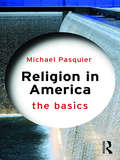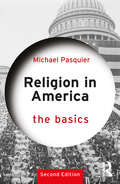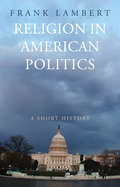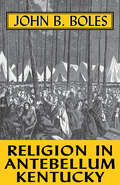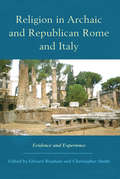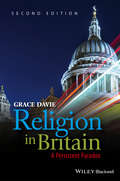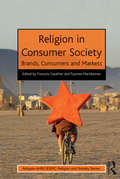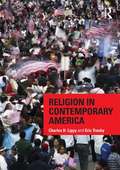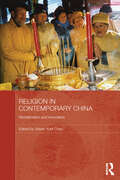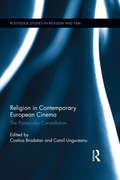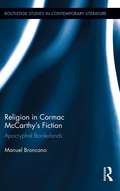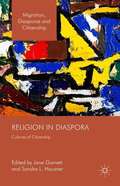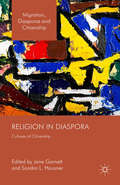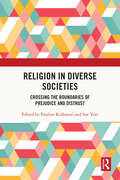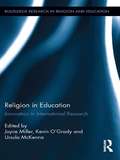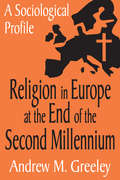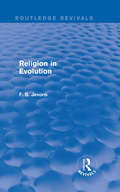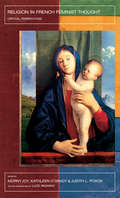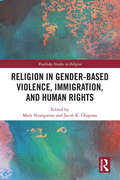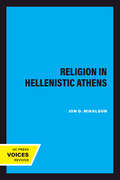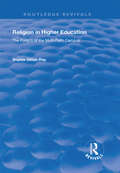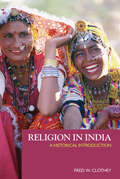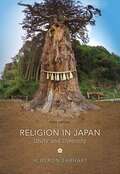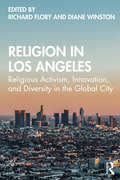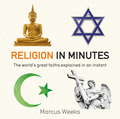- Table View
- List View
Religion in America: French Missionaries And The Roman Catholic Priesthood In The United States, 1789-1870 (The Basics)
by Michael PasquierReligion in America: The Basics is a concise introduction to the historical development of religions in the United States. It is an invitation to explore the complex tapestry of religious beliefs and practices that shaped life in North America from the colonial encounters of the fifteenth century to the culture wars of the twenty-first century. Far from a people unified around a common understanding of Christianity, Religion in America: The Basics tracks the steady diversification of the American religious landscape and the many religious conflicts that changed American society. At the same time, it explores how Americans from a variety of religious backgrounds worked together to face the challenges of racism, poverty, war, and other social concerns. Because no single survey can ever satisfy the need to know more and think differently, Religion in America prepares readers to continue studying American religions with their own questions and perspectives in mind.
Religion in America: The Basics (The Basics)
by Michael PasquierReligion in America: The Basics is a concise introduction to the historical development of religions in the United States. It is an invitation to explore the complex tapestry of religious beliefs and practices that shaped life in North America from the colonial encounters of the fifteenth century to the culture wars of the twenty-first century. Far from a people unified around a common understanding of Christianity, Religion in America: The Basics tracks the steady diversification of the American religious landscape and the many religious conflicts that have changed American society. At the same time, it explores how Americans from a variety of religious backgrounds worked together to face the challenges of racism, poverty, war, and other social concerns. This thoroughly revised second edition now covers the Obama and Trump administrations, Black Lives Matter, Christian nationalism, pluralism, and the development of the "nones" and the "unaffiliated." With each chapter featuring concise summaries and suggested further readings, this book is an invaluable resource for students approaching the history of religion in America for the first time.
Religion in American Politics: A Short History
by Frank LambertThe delegates to the 1787 Constitutional Convention blocked the establishment of Christianity as a national religion. But they could not keep religion out of American politics. From the election of 1800, when Federalist clergymen charged that deist Thomas Jefferson was unfit to lead a "Christian nation," to today, when some Democrats want to embrace the so-called Religious Left in order to compete with the Republicans and the Religious Right, religion has always been part of American politics. In Religion in American Politics, Frank Lambert tells the fascinating story of the uneasy relations between religion and politics from the founding to the twenty-first century. Lambert examines how antebellum Protestant unity was challenged by sectionalism as both North and South invoked religious justification; how Andrew Carnegie's "Gospel of Wealth" competed with the anticapitalist "Social Gospel" during postwar industrialization; how the civil rights movement was perhaps the most effective religious intervention in politics in American history; and how the alliance between the Republican Party and the Religious Right has, in many ways, realized the founders' fears of religious-political electoral coalitions. In these and other cases, Lambert shows that religion became sectarian and partisan whenever it entered the political fray, and that religious agendas have always mixed with nonreligious ones. Religion in American Politics brings rare historical perspective and insight to a subject that was just as important--and controversial--in 1776 as it is today.
Religion in Antebellum Kentucky
by John B. BolesA look at the Christian religions in the Bluegrass State before the Civil War from the author of the acclaimed Jefferson: Architect of American Liberty.Religion permeated the day-to-day life of antebellum Kentucky. This engaging account of Kentucky’s various Christian denominations, first published as part of the Kentucky Bicentennial Bookshelf, traces the history of the Great Revival of 1800–1805, the subsequent schism in Protestant ranks, the rise of Catholicism, the development of a distinctive black Christianity, and the growth of a Christian antislavery tradition.Paying special attention to the role of religion in the everyday life of early Kentuckians and their heritage, John B. Boles provides a concise yet enlightening introduction to the faith and the people of the Bluegrass State. Religion in Antebellum Kentucky is an excellent survey of religion and its significance in the first eighty-five years of Kentucky’s history.“A small historical gem . . . Boles has set an admirable standard of excellence for this sort of study.” —William and Mary Quarterly
Religion in Archaic and Republican Rome and Italy: Evidence and Experience
by Christopher Smith Edward BisphamFirst Published in 2001. Routledge is an imprint of Taylor & Francis, an informa company.
Religion in Britain: A Persistent Paradox
by Grace DavieReligion in Britain evaluates and sheds light on the religious situation in twenty-first century Britain; it explores the country’s increasing secularity alongside religion’s growing presence in public debate, and the impact of this paradox on Britain’s society. Describes and explains the religious situation in twenty-first century Britain Based on the highly successful Religion in Britain Since 1945 (Blackwell, 1994) but extensively revised with the majority of the text re-written to reflect the current situation Investigates the paradox of why Britain has become increasingly secular and how religion is increasingly present in public debate compared with 20 years ago Explores the impact this paradox has on churches, faith communities, the law, politics, education, and welfare
Religion in Consumer Society: Brands, Consumers and Markets (AHRC/ESRC Religion and Society Series)
by François GauthierPresenting an overview of an emerging field in the study of contemporary religion, this book, together with a complementary volume Religion in the Neoliberal Age, explores issues of religion, neoliberalism and consumer society. Claiming that we have entered a new phase that implies more than the recasting of state-religion relations, the authors examine how religious changes are historically anchored in modernity but affected by the commoditization, mediatization, neoliberalization and globalization of society and social life. Religion in Consumer Society explores religion as both shaped by consumer culture and as shaping consumer culture. Following an introduction which critically analyses studies on consumer culture and integrates scholarship in the sociology of religion, this book explores the following topics: how consumerism and electronic media have shaped globalized culture, and how this is affecting religion; the dynamics and characteristics of often overlooked middle-class religion, and how these relate to globalization and differences between 'developed' and 'emerging' countries; emerging trends, and how we understand phenomena as different as mega churches and holistic spiritualistic journeys, and how the pressures of consumer culture act on religious traditions, indigenous and exogenous; the politics of religious phenomena in the Age of Neoliberalism; and the hybrid areas emerging from these reconfigurations of religion and the market. Outlining changes in both the political-institutional and cultural spheres, the contributors offer an international overview of developments in different countries and state of the art representation of religion in the new global political economy.
Religion in Contemporary America
by Charles H. Lippy Eric TranbyThis book provides a fresh, engaging multi-disciplinary introduction to religion in contemporary America. The chapters explore the roots of contemporary American religion from the 1950s up to the present day, looking at the major traditions including mainline Protestantism, the evangelical-pentecostal surge, Catholicism, Judaism, African-American religions and new religious movements. The authors ask whether Americans are becoming less religious, and how religious thought has moved from traditional systematic theology to approaches such as black and feminist theology and environmental theology. The book introduces religion and social theory, and explores key issues and themes such as: religion and social change; politics; gender; sexuality; diversity; race and poverty. Students and instructors will find the combination of historical and sociological perspectives an invaluable aid to understanding this fascinating but complex field.
Religion in Contemporary China: Revitalization and Innovation (Routledge Contemporary China Series)
by Adam Yuet ChauBefore the modernist transformations of the twentieth century, China had one of the richest and most diverse religious cultures in the world. The radical anti-traditionalist policies of both the Republican and Communist regimes as well as other socio-historical factors posed formidable challenges to China’s religious traditions but, this book argues, these conditions also presented new opportunities for re-generation and innovation. It shows that economic reforms and the concurrent relaxation of religious policies have provided fertile ground for the revitalization of a wide array of religious practices, including divination, ancestor worship, temple festivals, spirit mediumism, churchgoing, funeral rites, exorcism, pilgrimages, sectarianism, sutra chanting, and the printing and distribution of morality books. Equally new forms of religious practices have emerged such as lay Buddhist preachers, "Maoist shamans", and a range of qigong sects/schools. Written by an international, interdisciplinary team of experts who have all conducted in-depth fieldwork research in China, this book provides a wide-ranging survey of contemporary religious practices in China. It examines the different processes and mechanisms of religious revivals and innovations, and, more broadly, relates the Chinese example of religious revitalization to larger issues of social and cultural continuity and change.
Religion in Contemporary European Cinema: The Postsecular Constellation (Routledge Studies in Religion and Film)
by Camil Ungureanu Costica BradatanThe religious landscape in Europe is changing dramatically. While the authority of institutional religion has weakened, a growing number of people now desire individualized religious and spiritual experiences, finding the self-complacency of secularism unfulfilling. The "crisis of religion" is itself a form of religious life. A sense of complex, subterraneous interaction between religious, heterodox, secular and atheistic experiences has thus emerged, which makes the phenomenon all the more fascinating to study, and this is what Religion in Contemporary European Cinema does. The book explores the mutual influences, structural analogies, shared dilemmas, as well as the historical roots of such a "post-secular constellation" as seen through the lens of European cinema. Bringing together scholars from film theory and political science, ethics and philosophy of religion, philosophy of film and theology, this volume casts new light on the relationship between the religious and secular experience after the death of the death of God.
Religion in Cormac McCarthy's Fiction: Apocryphal Borderlands (Routledge Studies in Contemporary Literature)
by Manuel BroncanoThis book addresses the religious scope of Cormac McCarthy’s fiction, one of the most controversial issues in studies of his work. Current criticism is divided between those who find a theological dimension in his works, and those who reject such an approach on the grounds that the nihilist discourse characteristic of his narrative is incompatible with any religious message. McCarthy’s tendencies toward religious themes have become increasingly more acute, revealing that McCarthy has adopted the biblical language and rhetoric to compose an "apocryphal" narrative of the American Southwest while exploring the human innate tendency to evil in the line of Herman Melville and William Faulkner, both literary progenitors of the writer. Broncano argues that this apocryphal narrative is written against the background of the Bible, a peculiar Pentateuch in which Blood Meridian functions as the Book of Genesis, the Border Trilogy functions as the Gospels, and No Country for Old Men as the Book of Revelation, while The Road is the post-apocalyptic sequel. This book analyzes the novels included in what Broncano defines as the South-Western cycle (from Blood Meridian to The Road) in search of the religious foundations that support the narrative architecture of the texts.
Religion in Diaspora: Cultures of Citizenship (Migration, Diasporas and Citizenship)
by Sondra L. Hausner Jane GarnettThis edited collection addresses the relationship between diaspora, religion and the politics of identity in the modern world. It illuminates religious understandings of citizenship, association and civil society, and situates them historically within diverse cultures of memory and state traditions.
Religion in Diaspora: Cultures of Citizenship (Migration, Diasporas and Citizenship)
by Sondra L. Hausner Jane GarnettThis edited collection addresses the relationship between diaspora, religion and the politics of identity in the modern world. It illuminates religious understandings of citizenship, association and civil society, and situates them historically within diverse cultures of memory and state traditions.
Religion in Diverse Societies: Crossing the Boundaries of Prejudice and Distrust
by Pauline Kollontai Sue YoreReligion in Diverse Societies: Crossing the Boundaries of Prejudice and Distrust contributes to existing cutting-edge research on the constructive way in which religion can support the promotion of respect, dignity, and justice for all people, considered as essential features in shaping sustainable, diverse, and peaceful societies. Through a combination of theoretical perspectives and theological analysis, applied to "real-life" contexts, the diverse contributions examine the role of religion in helping to achieve this and thereby challenge the attitudes and practices that create walls of prejudice and distrust.This timely volume provides a critical discussion of the complex role of religions in the public and political spheres in a range of global contexts and furthers the inter-religious, international, and interdisciplinary understanding of how religion can contribute to promoting and helping create inclusive and diverse societies.
Religion in Education: Innovation in International Research (Routledge Research in Religion and Education)
by Joyce Miller Kevin O’Grady Ursula McKennaThis volume explores numerous themes (including the influence of ethnography on religious education research and pedagogy, the interpretive approach to religious education, the relationship between research and classroom practice in religious education), providing a critique of contemporary religious education and exploring the implications of this critique for initial and continuing teacher education.
Religion in Europe at the End of the Second Millenium: A Sociological Profile
by Andrew M. GreeleyMost sociologists of religion describe a general decline in religious faith and practice in Europe over the last two centuries. The secularizing forces of the Enlightenment, science, industrialization, the influence of Freud and Marx, and urbanization are all felt to have diminished the power of the churches and demystified the human condition. In Andrew Greeley's view, such overarching theories and frameworks do not begin to accommodate a wide variety of contrasting and contrary social phenomena. Religion at the End of the Second Millennium engages the complexities of contemporary Europe to present a nuanced picture of religious faith rising, declining, or remaining stable.
Religion in Evolution (Routledge Revivals)
by F. B. JevonsFirst published in 1906, these four lectures were originally delivered in the Vacation Term for Biblical Study at Cambridge. Evidence is derived from the native tribes of Australia in particular, whom Jevons compares for his discussion. The first lecture considers whether religion has evolved from, or was preceded by a pre-religion, or non-religious, stage of humankind. The following lectures discuss the science of religion and the theory of Evolution, and the relationship between the evolution of religion and the philosophy of religion. This is a fascinating text that will be of particular value to students interested in the history and development of religion in general.
Religion in French Feminist Thought: Critical Perspectives
by Morny Joy Kathleen O’Grady Judith L. PoxonReligion in French Feminist Thought: Critical Perspectives brings together some of the leading modern religious responses to major French feminist writings on religion. It considers central figures such as Hélène Cixous, Julia Kristeva, Luce Irigaray and Catherine Clément, and its focus on questions of divinity, subjectivity, and ethics provides an accessible introduction to an area of growing philosophical interest.Illustrating the ways in which French feminism has become a valuable tool in feminist efforts to rethink religion, and responding to its promise as an intellectual resource for religious philosophy in the future, Religion in French Feminist Thought is ideal both for independent use and as a companion book to French Feminists on Religion (Routledge, 2001).
Religion in Gender-Based Violence, Immigration, and Human Rights (Routledge Studies in Religion)
by Jacob K. Olupona Mary NyangwesoThis book builds on work that examines the interactions between immigration and gender-based violence, to explore how both the justification and condemnation of violence in the name of religion further complicates our societal relationships. Violence has been described as a universal challenge that is rooted in the social formation process. As humans seek to exert power on the other, conflict occurs. Gender based violence, immigration, and religious values have often intersected where patriarchy-based power is exerted on the other. An international panel of contributors take a multidisciplinary approach to investigating three central themes. Firstly, the intersection between religion, immigration, domestic violence, and human rights. Secondly, the possibility of collaboration between various social units for the protection of immigrants’ human rights. Finally, the need to integrate faith-based initiatives and religious leaders into efforts to transform attitude formation and general social behavior. This is a wide-ranging and multi-layered examination of the role of religion in gender-based violence and immigration. As such, it will be of keen interest to academics working in religious studies, gender studies, politics, and ethics.
Religion in Hellenistic Athens (Hellenistic Culture and Society #29)
by Jon D. MikalsonUntil now, there has been no comprehensive study of religion in Athens from the end of the classical period to the time of Rome's domination of the city. Jon D. Mikalson provides a chronological approach to religion in Hellenistic Athens, disproving the widely held belief that Hellenistic religion during this period represented a decline from the classical era. Drawing from epigraphical, historical, literary, and archaeological sources, Mikalson traces the religious cults and beliefs of Athenians from the battle of Chaeroneia in 338 B.C. to the devastation of Athens by Sulla in 86 B.C., demonstrating that traditional religion played a central and vital role in Athenian private, social, and political life. Mikalson describes the private and public religious practices of Athenians during this period, emphasizing the role these practices played in the life of the citizens and providing a careful scruntiny of individual cults. He concludes his study by using his findings from Athens to call into question several commonly held assumptions about the general development of religion in Hellenistic Greece.
Religion in Higher Education: The Politics of the Multi-Faith Campus
by Sophie Gilliat-RayThis title was first published in 2000. The place of religion in universities and institutes of higher education has become increasingly topical and contested in recent years, largely due to the growth of religious diversity on campus. Issues such as shared worship spaces, equal opportunities, and the management of inter-religious conflict, concern university administrators and students alike. Based on primary empirical research, this book indicates the need for clear guidelines on these issues and provides the data to inform policy-making. Offering the first study of the practical and sociological implications of the multi-faith campus, this book provides a context for examining some of the dynamics of religious diversity in Britain more generally as well as providing a useful analysis for the wider international context. Key themes covered include: religion in institutions; inter-faith relations; the changing roles of religious professionals; secularisation and resacralisation; and religion, youth and identity.
Religion in India: A Historical Introduction
by Fred W. ClotheyReligion in India is an ideal first introduction to India's fascinating and varied religious history. Fred Clothey surveys the religions of India from prehistory and Indo-European migration through to the modern period. Exploring the interactions between different religious movements over time, and engaging with some of the liveliest debates in religious studies, he examines the rituals, mythologies, arts, ethics and social and cultural contexts of religion as lived in the past and present on the subcontinent. Key topics discussed include: Hinduism, its origins and development over time minority religions, such as Christianity, Judaism, Islam, Sikhism, Zoroastrianism, Jainism and Buddhism the influences of colonialism on Indian religion the spread of Indian religions in the rest of the world the practice of religion in everyday life, including case studies of pilgrimages, festivals, temples and rituals, and the role of women Written by an experienced teacher, this student-friendly textbook is full of clear, lively discussion and vivid examples. Complete with maps and illustrations, and useful pedagogical features, including timelines, a comprehensive glossary, and recommended further reading specific to each chapter, this is an invaluable resource for students beginning their studies of Indian religions.
Religion in Japan: Unity and Diversity
by H. Byron EarhartThis standard text explores religion in Japan as a complex tapestry of different religious strands, reflecting both the unity and diversity of Japanese culture, a theme Earhart pioneered in the first edition (1969) of this enduring, classic book--a theme he has devoted subsequent decades to refining through cutting-edge scholarship and keen observation of the evolving religious scene. Tracing the development of religious traditions from the prehistoric era through modern times, Earhart explores the vital influence of Shinto, Buddhism, Daoism, Confucianism, and folk religion. Presuming no technical or academic background, the text guides students to key Japanese religious themes, which include the proximity of humans and gods, the religious character of the family, the bond between religion and the nation, and the pervasiveness of religion in everyday life. This new edition updates the description and interpretation of the entire history of religion in Japan in light of the latest developments in the field. In the latter chapters, changes in the contemporary scene are highlighted, discussing Tokyo Disneyland, manga, and anime as "alternative reality," as well as the innovations in more "traditional" events such as wedding ceremonies and rites for the dead.
Religion in Los Angeles: Religious Activism, Innovation, and Diversity in the Global City
by Richard FloryWhy has Los Angeles been a hotspot for religious activism, innovation, and diversity? What makes this Southern California metropolis conducive to spiritual experimentation and new ways of believing and belonging? A center of world religions, Los Angeles is the birthplace of Pentecostalism, the site of the largest Roman Catholic diocese in the United States, the home of more Buddhists anywhere except for Asia, and home base for myriad transnational, spiritual movements. Religion in Los Angeles examines historical and contemporary examples of Angelenos’ openness to new forms of belief and practice in congregations, communities, and civic life. Case studies include Latino spiritualities and social activism Hybrid Jewish identities Capitalism and fundamentalism in early twentieth-century Los Angeles The impact of the 1960s on Roman Catholic Angelenos Christianity through a Hindu lens. Highlighted throughout the work are themes including the impact of the city’s diversity on religious experimentation, the importance of Los Angeles’ location in relation to the Mexican border and as a gateway to the Pacific, and the impact of local politics, social trends, and cultural change on religious innovation. The volume also examines the creative pull between change and continuity and the recognition that religious communities participate in civic and global conversations. Religion in Los Angeles includes contributions by leading sociologists, anthropologists, and historians. This cutting-edge work will be of interest to students and scholars of religious history, religion in America, sociology of religion, American studies, urban studies, and race/ethnic studies.
Religion in Minutes (IN MINUTES)
by Marcus WeeksLearn about the religions of the world - in minutes. What are the differences between Sunni and Shi'a, Catholic and Protestant, Buddhism and Confucianism? Who were Moses, Jesus and Muhammad, and what did they really preach? Why are the concepts of karma, jihad and nirvana so important? And what do the religions of the world say about life, death and how we should act? Answering these and many other critical questions, this book explains the histories, key texts, prophets and essential teachings of the ancient and modern religions and their offshoots, including: Judaism, Christianity, Islam, Hinduism, Buddhism, Sikhism, Greek, Roman and Norse mythologies, indigenous traditional religions, Zoroastrianism, Jainism, Daoism, Confucianism, Shinto, Catholicism, Protestantism, Anglicanism, Baptists, Methodists, Puritans, Mormons, Sufism, Hasidism, Scientology, Baha'I, New pagans and many more, as well as considering their common themes and the future of religion.Clear, concise and with 200 iconic images, Religion in Minutes is the fastest, fullest way to understand the beliefs that shape the world around us.
